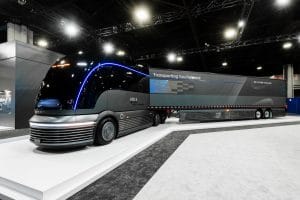
At the recent North American Commercial Vehicle (NACV) show in Atlanta, Georgia, the Hyundai Group showed a side of their conglomerate’s portfolio that most automotive journalists rarely get a chance to sample: Commercial vehicles.
Think about the impact that commercial vehicles have on our daily lives and on the U.S. and world economies. Twenty-four hours a day, 365 days a year, there’s a commercial rig on the road delivering goods, provisions, resources and services to the world’s billions.
Water, food, clothing, construction and home improvement materials, automobiles, electronics and other goods are loaded into vehicles of various sizes. And while small commercial vehicles have an impact on daily life (UPS, FedEx and service vehicles, among others), big rigs have a major influence on the same.
(Hyundai Partnering with Aptiv — Targeting “Production-Ready” Robocabs by 2022)
In the United States and other countries, road-going “tractors” are connected to large “trailers” and filled to the gills to keep commerce moving. With proper maintenance, these often-diesel-powered trucks can cover millions of miles during their useful lifespans, and represent a favorable investment for owners and owner-operators.
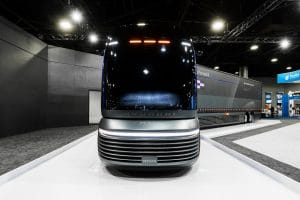
And while diesel power moves a large segment of commerce today, there has been a major push in the U.S. vehicle industry towards alternative propulsion methods. You’ve been reading about battery-propulsion electric and hybrid electric vehicles like Tesla electric cars and Toyota hybrids, Nissan Leafs and Chevy Bolts.
Lesser known in the fray are vehicles like the Honda Clarity, Toyota Mirai and Hyundai Nexo. These vehicles use naturally abundant hydrogen and oxygen within a fuel cell to generate electricity to drive the electric motors in these so-called Fuel Cell Electric Vehicles (FCEV). FCEV’s are super clean, with zero emissions. After the hydrogen/oxygen mix in the fuel cells, they only emit water vapor.
So why this push towards alternative propulsion?
Experts across several fields have varying timelines, but nearly all agree that at some point in the future, the earth will run out of so called “fossil fuels,” i.e., oil and natural gas. The world’s appetite for oil and gas in insatiable, but reality dictates that now is the time to accelerate preparations for the possibility of the oil “well” running dry.
Some manufacturers are betting on electric power as the best source now and in the future for alternative propulsion. Hyundai, a global leader in fuel cell technology thinks otherwise and is “all in” on hydrogen powered vehicles.
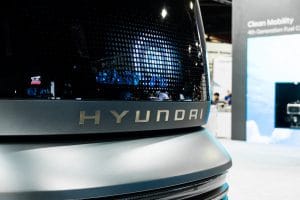
The Hyundai Motor Group started FCEV development in 1998, and in 2013, launched the first mass-produced and commercially available fuel cell electric vehicle. In 2018, Hyundai launched the dedicated FCEV, NEXO. In December 2018, Hyundai invested $6.4 billion to accelerate the development of a hydrogen society, looking beyond passenger vehicles.
I’ve driven Honda, Toyota and Hyundai hydrogen cars, but this was my first dance with a commercial FCEV.
World Debut
In a world debut at the NACV show, Hyundai unveiled the HDC-6 Neptune concept tractor, and the HT Nitro ThermoTech concept trailer as part of Hyundai’s “FCEV 2030” vision for a hydrogen ecosystem. The goal of FCEV 2030 is to have 500,000 FCEV on roads worldwide by 2030.
Adding to Hyundai’s sustainable mobility vision, the HT Nitro ThermoTech will be one of the first trailers in North America to introduce a refrigerated trailer using a cryogenic nitrogen refrigeration technology system. The HT Nitro ThermoTech concept trailer’s carbon footprint is up to 90% less than a traditional unit.
HDC-6 Neptune Concept
One of the key design inspirations for the HDC-6 Neptune Concept was the Streamliner railway trains that ran from 1936 until 1959, a prime example of art deco industrial design. The Streamliners symbolized a technological wonder of the era, while looking bold and iconic at the same time.
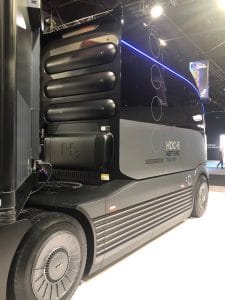
HDC-6 Neptune employs this inspired function driven design, with new ways to combine both form and function to create an entirely unique new solution within the commercial vehicle industry, while offering a holistic global approach.
“The fuel cell powertrain gave us the opportunity to redefine the classical typology and architecture of the truck,” said Luc Donckerwolke, chief design officer of Hyundai Motor Group. “The Hyundai Commercial Vehicles Design Team started with a white sheet of paper focusing on the new defined functionality resetting all standards in order to project commercial vehicles in the future.”
(Hyundai Brings New Angle to Frankfurt 45 Concept)
On HDC-6 Neptune, the design team tackled packaging challenges and found new ways to combine both form and function. Due to increased cooling requirements, the grill of the concept commercial vehicle is applied as the theme across the entire lower portion of the Hyundai HDC-6 Neptune. This creates a distinctive image while maximizing airflow. The grill concept also integrates retractable steps, which are hidden. The combination of both cab over engine and conventional hood truck formats helps achieve packaging efficiency and improved ergonomics.
“HDC-6 Neptune, the concept for the next-generation fuel-cell electric truck, embodies Hyundai Motor’s vision of mobility for a global hydrogen society, innovatively developed applying Hyundai designers’ creativity and the company’s advanced technology,” said Sang Yup Lee, head of Hyundai Design Center.
“To maximize the potential of a next-generation fuel-cell electric vehicle, HDC-6 Neptune delivers groundbreaking futuristic architecture. In particular, one can understand Hyundai’s novel approach to the interior design of the space and in capturing lifestyle-oriented mobility.”
Inside HDC-6 is a gaggle of gee-whiz technology, aimed at lessening the mental and physical load on long-haul truckers. Touch screens, comprehensive Head Up Displays, the ability to view entertainment or computer screens across the vast expanse of windshield when parked, and boutique hotel type living space showcase premium features more often associated with Hyundai’s Genesis luxury brand than road trucks.
HT Nitro ThermoTech Concept
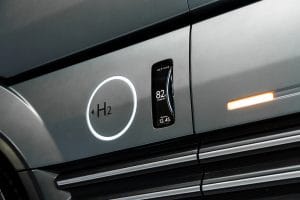
The HT Nitro ThermoTech concept trailer provides a response to the rising challenges of clean transportation: reducing greenhouse gases and dependence on fossil fuels while maintaining competitiveness.
The HT Nitro ThermoTech concept trailer is optimal for transporting cold chain products (like frozen food). Temperatures are reduced more quickly than a traditional refrigeration unit and maintained with precise control of desired temperatures. An intelligent control system and independent cooling power maximize thermal efficiency.
Through a one-piece structural foam panel design, the HT Nitro Thermo Tech boasts a lighter weight trailer with increased wall strength and enhanced thermal efficiency, while maintaining the same cubic trailer volume. The HT Nitro ThermoTech concept trailer is not affected by outside temperatures. Maximum power is always available, even when the truck’s engine is off or idling.
The HT Nitro ThermoTech concept trailer-cooling unit is virtually noiseless which significantly reduces noise pollution for drivers as well as at the point of deliveries. This is a significant advantage for nighttime deliveries in urban and suburban neighborhoods where noise can be distracting.
The HT Nitro ThermoTech concept trailer also features new, enhanced structural designs. The sidewall, front wall, and roof are each constructed as a one-piece, structural sandwich foam panel with Fiber Reinforced Polymer (FRP) skins. The materials are made without posts and roof bows. The improved structure panels are bonded to the rails, which reduce thermal bridges, remove potential water intrusion, and provide a cleaner finish.
The HDC-6 Neptune /HT Nitro ThermoTech trailer evolves the Class 8 truck, looking toward the future in propulsion, design, and in-cab technology. The HDC-6 is also in testing for autonomous capability.
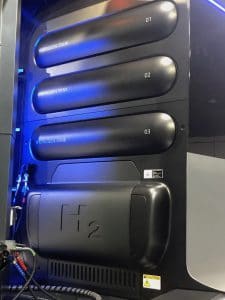
The BEV Factor
So what about Battery Electric Vehicle (BEV) electric commercial vehicles? The leader of one major company vested in BEV production referred to FCEV’s as “Fool” Vehicles instead of “Fuel” Vehicles. But in the big rig (Class 8) arena, it appears that FCEV’s may have a decided advantage for long haul trucking.
Consider that it would take eight tons of batteries for a Class 8 full electric rig to travel 500 kilometers (311 miles-based on battery output and expected loads). Hydrogen fuel tanks are lightweight, and even with stored hydrogen in gas or liquid form, FCEV’s offer a considerable weight advantage over BEVs, requiring 1.5 tons of fuel cells and hydrogen gas to propel the HDC-6 the same distance. Payload equals money in the long-haul trucking business, and if the bulk of your payload is used for propulsion, the business case for long haul BEV lessens. FCEV’s also have a decided advantage in the time it takes for a full refill of hydrogen versus fully recharging a battery stack.
It should also be noted that more than 60 countries (The Hydrogen Council) are involved in developing FCEV technology and infrastructure, which remains a critical issue with a clear advantage to BEVs in terms of the number of charging versus refueling stations across the U.S. Hyundai also stated that it works with Toyota and Honda, also vested heavily in FCEV technology and development.
(Hyundai Joins Growing List of Automakers Electrifying Motorsports Programs)
Stay tuned.







